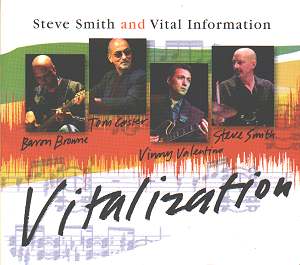1.
Interwoven Rhythms - Synchronous
2.
Get Serious
3.
The Trouble With
4.
The Bottom Line
5.
Seven and a Half
6.
Interwoven Rhythms - Dialogue
7.
J Ben Jazz
8.
Groove Time
9.
You Know What I Mean
10.
The Closer
11.
Jimmy Jive
12.
Positano
Steve
Smith - Drums, konnakol
Tom
Coster - Keyboards, accordion
Baron
Browne - Bass
Vinny
Valentino - Guitar
Bill
Evans - Tenor sax, soprano sax (tracks 3,
4, 8, 9)
Pete
Lockett - Tabla, kanjira, percussion, konnakol
(tracks 1, 2, 5, 6, 9, 12)
Gilad
- Congas, percussion (tracks 2, 7-9)
Juan
Carlos Melián - Congas, percussion
(tracks 2, 8, 9).
When
jazz-rock (now generally known as jazz-fusion,
or just fusion) arose in the late sixties,
some people regarded it as a dangerous perversion
of jazz. But many jazz musicians have kept
faith with the genre, including drummer Steve
Smith, who has held Vital Information together
for some years playing in this style. However
much some purists sneered or condemned, jazz-rock
brought some fresh influences into jazz which
are still evident today. Many jazz groups
now naturally include eight-in-a-bar tunes
in their repertoire, and the bass and drum
patterns of rock music have enriched the jazz
vocabulary - even tightening up the precision
of playing.
Precision
is one of the hallmarks of this album. These
guys can turn on a sixpence (as we used to
say before decimalisation). They negotiate
difficult sequences and rhythms with impeccable
timing. But they can also swing like mad,
as they prove on The Bottom Line and
The Closer, which both have the sort
of unstoppable forward motion of some of George
Benson's early recordings before his singing
took precedence over his guitar. Jimmy
Jive is a straightforward blues swinger
in 4/4: dedicated to Jimmy Smith, with his
kind of easy groove.
Jazz-fusion
is well-named, because it not only mingled
jazz with rock rhythms but also opened the
door for influences from other musical styles,
such as World Music. This is evident on the
two tracks entitled Interwoven Rhythms,
where Steve Smith and percussionist Pete Lockett
duet in the southern Indian style of vocal
music called konnakol - reeling off percussive
syllables that sound like the tabla, which
Pete also plays on the first track. Steve's
drums seem to be echoing Indian beats in Seven
and a Half, which has an intriguingly
dislocated pulse because of its 15/8 time
signature.
Steve
Smith doesn't dominate the band, staying in
the background on several tracks, content
to lay down a sturdy beat alongside bassist
Baron Browne. But when Steve solos - wow!
you really know about it. His technique is
awesome and very exciting. Audiences often
applaud drum solos because there is something
visceral about unfettered percussion. Yet
Steve integrates his soloing into the band,
as the other musicians generally keep playing
around him, providing a frame for his solos.
After
all the sound and fury, the CD closes with
a meditative slow tune, Positano, composed
by Vinny Valentino and featuring Tom Coster
on accordion. All four members of the group
display stunning virtuosity throughout the
album. Long-time member Tom Poster is a tower
of strength on various keyboards, while new
man Vinny Valentino (replacing former guitarist
Frank Gambale) is both inventive and funky.
The guests - especially saxist Bill Evans
- add to the palette of sounds. Steve Smith
and his colleagues show that jazz-fusion is
not only alive and well but also developing
in new directions.
Tony
Augarde
